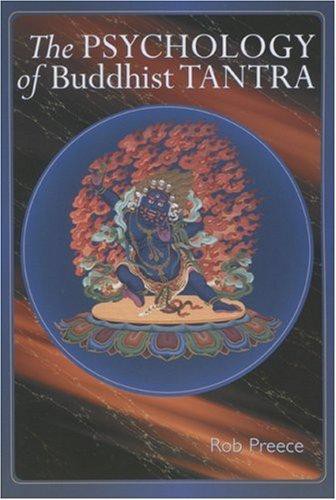

Most ebook files are in PDF format, so you can easily read them using various software such as Foxit Reader or directly on the Google Chrome browser.
Some ebook files are released by publishers in other formats such as .awz, .mobi, .epub, .fb2, etc. You may need to install specific software to read these formats on mobile/PC, such as Calibre.
Please read the tutorial at this link: https://ebookbell.com/faq
We offer FREE conversion to the popular formats you request; however, this may take some time. Therefore, right after payment, please email us, and we will try to provide the service as quickly as possible.
For some exceptional file formats or broken links (if any), please refrain from opening any disputes. Instead, email us first, and we will try to assist within a maximum of 6 hours.
EbookBell Team

4.4
52 reviewsThis book masterfully clarifies the nature of tantric practice. In contrast to the approaches of conventional religion, tantra does not attempt to soothe the turmoil of existence with consoling promises of heaven and salvation. The tantric practitioner chooses to confront the bewildering and chaotic forces of fear, aggression, desire, and pride, and to work with them in such a way that they are channeled into creative expression, loving relationships, and wisely engaged forms of life. In order to make the processes of tantra psychologically intelligible for a contemporary reader, Rob Preece makes judicious use of the work of modern psychotherapy, forging a compelling link between a Western tradition that hearkens back to the alchemical traditions of our own past and the comparably alchemical strategies of Tibetan Buddhist tantric practices. In keeping with the pragmatic and therapeutic aims of both psychotherapy and Buddhist meditation, The Psychology of Buddhist Tantra never loses sight of the central importance of applying these ideas to the concrete realities of day-to-day life. By illuminating the richly symbolic language of tantra through the intermediate language of psychology, The Psychology of Buddhist Tantra points to the transformative nature of tantric practices.
Review"British psychologist and longtime Tibetan Buddhist practitioner Rob Preece has given us one of the most illuminating unpackings of Tibetan tantra yet to emerge in the English language."—Mark Epstein, author of Thoughts Without a Thinker: Psychotherapy from a Buddhist Perspective
"The Psychology of Buddhist Tantra succeeds in clarifying the nature of tantric practice. He does not seek to explain away the undeniably evocative and darkly potent language and imagery of tantra but to recognize them as transformative symbols of the rich complexity of our own inner lives."—Stephen Batchelor, author of Buddhism without Beliefs
"The ancient therapeutic wealth and alchemy of the East is skillfully integrated into the pragmatism of the West, creatively transforming the present-day individual."—East and West Series
"Draws on Jung's writings on Tantra and other Buddhist teachings to explore the rich symbolism and imagery of Tantra as a pattern for personal and spiritual growth."—The Middle Way
"Following on the heels of The Wisdom of Imperfection: the Challenge of Individuation in Buddhist Life, Preece (Tibetan Buddhist teacher and transpersonal psychotherapist) offers another accessible, insightful, and engaging interweaving of Buddhist and Jungian perspectives on psychospiritual transformation. . . . Preece delivers a number of perceptive insights on the obstacles encountered when traditional Asian practices are transplanted onto modern Western psychological and cultural soil. Recommended for the general reader."—University Religious Studies Review
"Allows readers to overcome common boundaries between Eastern philosophy and Western results-driven psychology, offering chapters based on Buddhist tantric strategies to keep results centered on life experience as well as spiritual purpose. The result is an outstanding melding of two often different philosophies."—The Midwest Book Review
From the Back CoverThis book masterfully succeeds in clarifying the nature of tantric practice. In contrast to the approaches of conventional religion, tantra does not attempt to soothe the turmoil of existence with consoling promises of heaven and salvation. The tantric practitioner chooses to confront the bewildering and chaotic forces of fear, aggression, desire, and pride, and to work with them in such a way that they are channeled into creative expression, loving relationships, and wisely engaged forms of life.
In order to make the processes of tantra psychologically intelligible for a contemporary reader, Rob Preece makes judicious use of the work of modern psychotherapy, forging a compelling link between a Western tradition that hearkens back to the alchemical traditions of our own past and the comparably "alchemical" strategies of Tibetan Buddhist tantric practices. In keeping with the pragmatic and therapeutic aims of both psychotherapy and Buddhist meditation, The Psychology of Buddhist Tantra never loses sight of the central importance of applying these ideas to the concrete realities of day-to-day life.
By illuminating the richly symbolic language of tantra through the intermediate language of psychology, The Psychology of Buddhist Tantra points to the transformative nature of tantric practices.
"The Psychology of Buddhist Tantra succeeds in clarifying the nature of tantric practice. He does not seek to explain away the undeniably evocative and darkly potent language and imagery of tantra but to recognize them as transformative symbols of the rich complexity of our own inner lives."--Stephen Batchelor, author of Buddhism without Beliefs